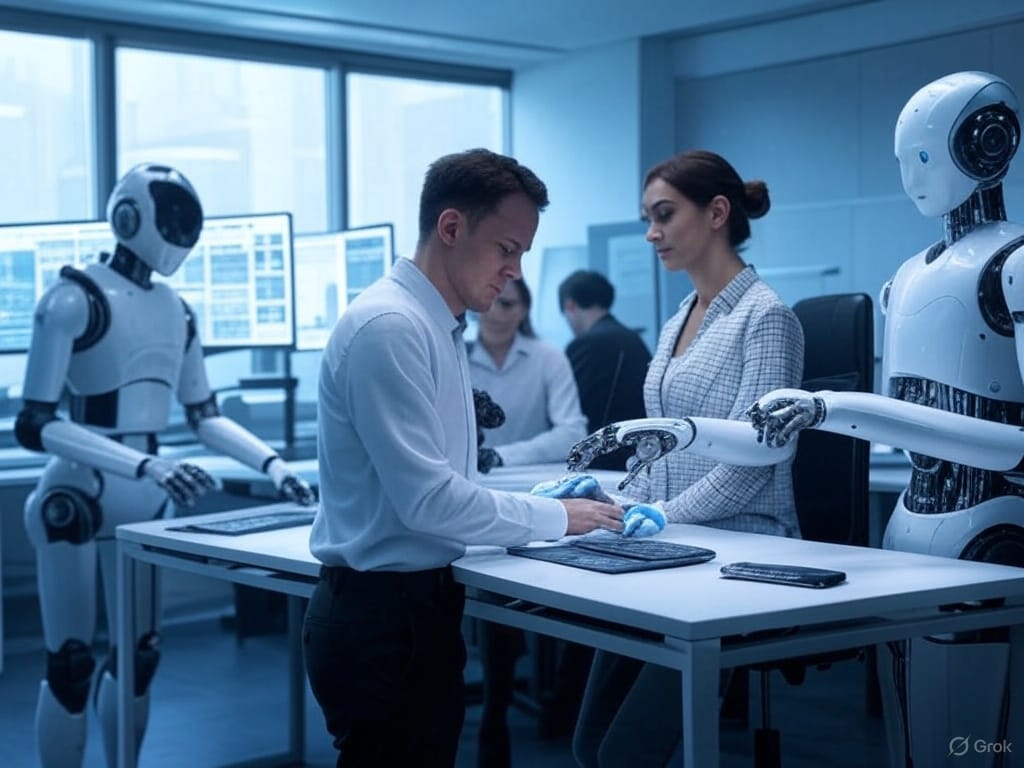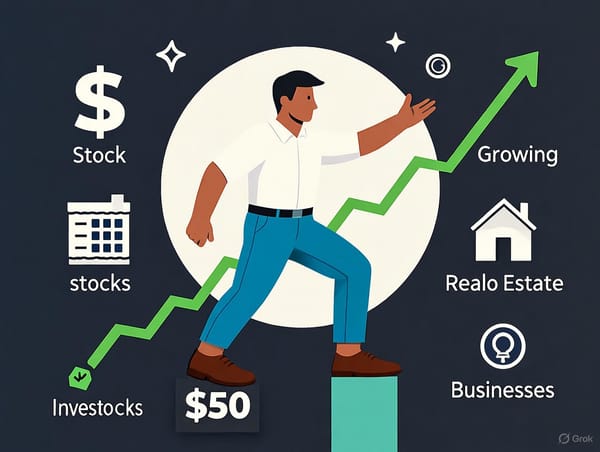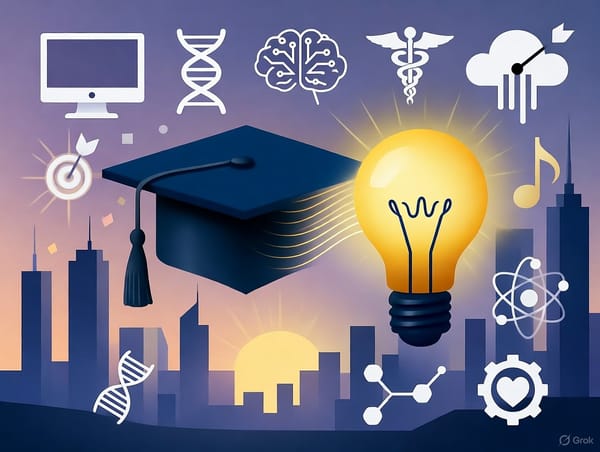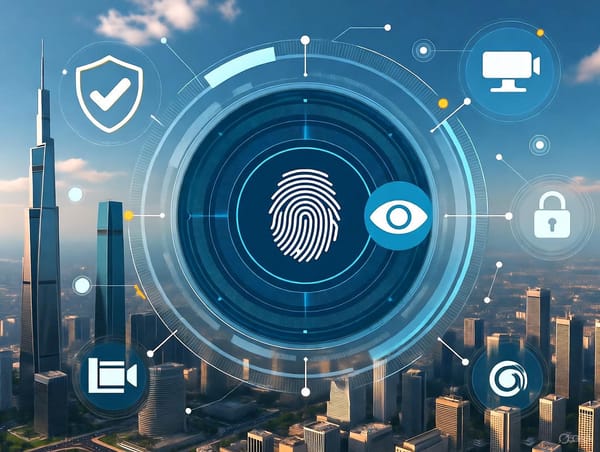The Future of Work
AI is not just automating jobs but redefining careers, creating a future where adaptability and collaboration with technology are key to thriving.

Artificial Intelligence (AI) is no longer a distant concept confined to science fiction—it’s here, reshaping the way we work, live, and interact with the world. From automating repetitive tasks to unlocking entirely new career paths, AI is transforming industries at an unprecedented pace. But what does this mean for the future of work? How will it redefine careers, and more importantly, how can individuals and organizations prepare for this seismic shift? In this article, we’ll dive deep into the ways AI is revolutionizing industries, the jobs it’s automating, the opportunities it’s creating, and the steps you can take to thrive in this AI-driven era.
The AI Revolution Across Industries
AI’s influence spans virtually every sector, from healthcare to finance, manufacturing to entertainment. In healthcare, AI-powered tools are assisting doctors with diagnostics, predicting patient outcomes, and even personalizing treatment plans. In finance, algorithms analyze market trends in real-time, while AI chatbots handle customer inquiries with efficiency that rivals human agents. Manufacturing has seen robotic systems streamline production lines, and in entertainment, AI is generating music, scripts, and even hyper-realistic visuals.
This transformation isn’t just about efficiency—it’s about reimagining what’s possible. Take retail as an example: AI-driven recommendation engines don’t just suggest products; they anticipate customer needs, driving sales and enhancing user experiences. Across these industries, AI is acting as both a disruptor and an enabler, forcing businesses to adapt or risk obsolescence.
What’s at Stake?
One of the most talked-about aspects of AI is its ability to automate tasks traditionally performed by humans. Repetitive, rule-based jobs—like data entry, assembly line work, and basic customer service—are increasingly being handed over to machines. A 2023 report from the World Economic Forum estimated that by 2025, automation and AI could displace around 85 million jobs globally. That’s a staggering figure, and it’s easy to see why this sparks concern.
But automation isn’t a monolith. It’s not about eliminating humans from the workforce entirely—it’s about shifting where human effort is applied. For instance, while AI can process vast datasets faster than any human, it still lacks the emotional intelligence and creativity needed for roles like counseling, strategic decision-making, or artistic innovation. Jobs that require empathy, complex problem-solving, or nuanced judgment are likely to remain in human hands for the foreseeable future.
That said, the transition won’t be seamless. Workers in highly automatable fields—think truck drivers facing self-driving vehicles or accountants competing with AI tax software—may need to reskill to stay relevant. The challenge lies in ensuring this shift doesn’t widen inequality or leave entire communities behind.
New Opportunities in an AI-Driven World
While AI may close some doors, it’s opening others—often in unexpected ways. The same World Economic Forum report that predicted job displacement also forecasted the creation of 97 million new roles by 2025, outpacing losses. These emerging opportunities are tied directly to AI’s growth, spanning technical, creative, and hybrid fields.
Technical Roles
The demand for AI specialists—data scientists, machine learning engineers, and robotics experts—is skyrocketing. Companies need professionals who can design, train, and maintain AI systems. Even beyond pure AI roles, IT professionals who understand how to integrate AI into existing infrastructure are becoming invaluable.
Creative and Hybrid Careers
AI isn’t just for coders. It’s spawning hybrid roles that blend technology with human creativity. Consider “prompt engineers,” a job that didn’t exist a few years ago, where individuals craft inputs to guide AI tools like language models or image generators. Marketers are using AI to analyze consumer behavior, while writers collaborate with AI to brainstorm ideas or refine drafts. These roles require a mix of technical literacy and creative flair, proving that AI can amplify human ingenuity rather than replace it.
The Rise of the “Human-in-the-Loop”
Another exciting trend is the “human-in-the-loop” model, where AI and humans work in tandem. For example, radiologists use AI to flag potential issues in scans, but they make the final diagnosis. This collaboration enhances productivity and accuracy, creating a new category of jobs that leverage both human expertise and machine precision.
Skills and Mindsets
The future of work isn’t something to fear—it’s something to prepare for. Whether you’re a student, a mid-career professional, or a business leader, adapting to an AI-driven world requires a proactive approach. Here’s how to get ready.
Upskilling and Reskilling
The skills of tomorrow are already in demand today. Learning the basics of AI, data analysis, or programming can set you apart, even if you’re not aiming for a tech career. Platforms like Coursera, Udemy, and LinkedIn Learning offer accessible courses on these topics. For those in automatable roles, pivoting to adjacent fields—like moving from bookkeeping to financial analysis—can provide a lifeline.
Soft skills matter too. Critical thinking, adaptability, and emotional intelligence are harder for AI to replicate and will remain essential in any job. Employers increasingly value workers who can navigate ambiguity and collaborate effectively, both with humans and machines.
Embracing Lifelong Learning
The pace of AI innovation means that no skill set is future-proof forever. Adopting a mindset of lifelong learning—staying curious and open to new tools—will be key. This might mean experimenting with AI platforms in your current role or attending industry conferences to spot emerging trends.
For Organizations: Building an AI-Ready Workforce
Businesses have a role to play too. Forward-thinking companies are investing in employee training programs, fostering cultures of innovation, and rethinking job descriptions to incorporate AI tools. Rather than slashing headcounts, they’re redeploying talent to higher-value tasks—turning automation into an opportunity for growth.
Society and Ethics
AI’s impact on work doesn’t exist in a vacuum—it’s tied to broader societal questions. How do we ensure equitable access to reskilling programs? What happens to workers in regions hit hardest by automation? And how do we address ethical concerns, like bias in AI decision-making or the environmental cost of training massive models?
Governments, educators, and corporations will need to collaborate to answer these questions. Policies like universal basic income, expanded vocational training, or tax incentives for companies that prioritize human-AI collaboration could smooth the transition. At the same time, individuals must advocate for themselves, seeking out resources and opportunities to stay competitive.
A Future to Shape, Not Fear
The future of work, redefined by AI, is a double-edged sword—disruptive yet full of potential. It’s automating the mundane, challenging us to rethink our roles, and creating possibilities we’re only beginning to grasp. By understanding its impact, embracing new skills, and fostering adaptability, we can turn this transformation into an era of empowerment rather than uncertainty.
AI isn’t here to replace us—it’s here to redefine what we’re capable of. The question isn’t whether AI will change your career, but how you’ll harness it to shape the future you want. The tools are at your fingertips; the next step is yours to take.





